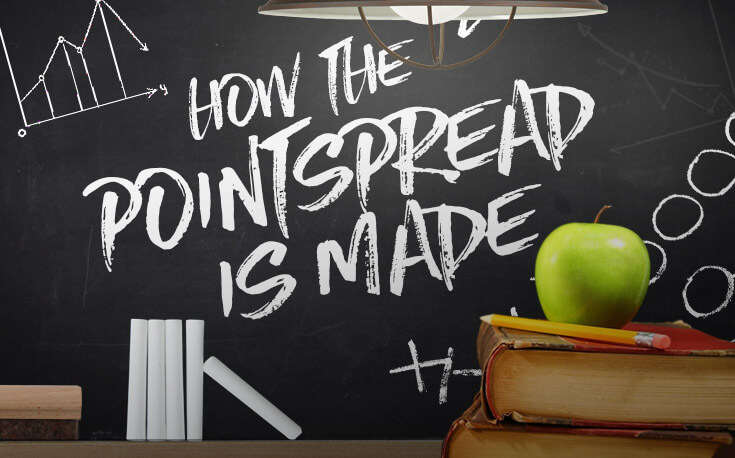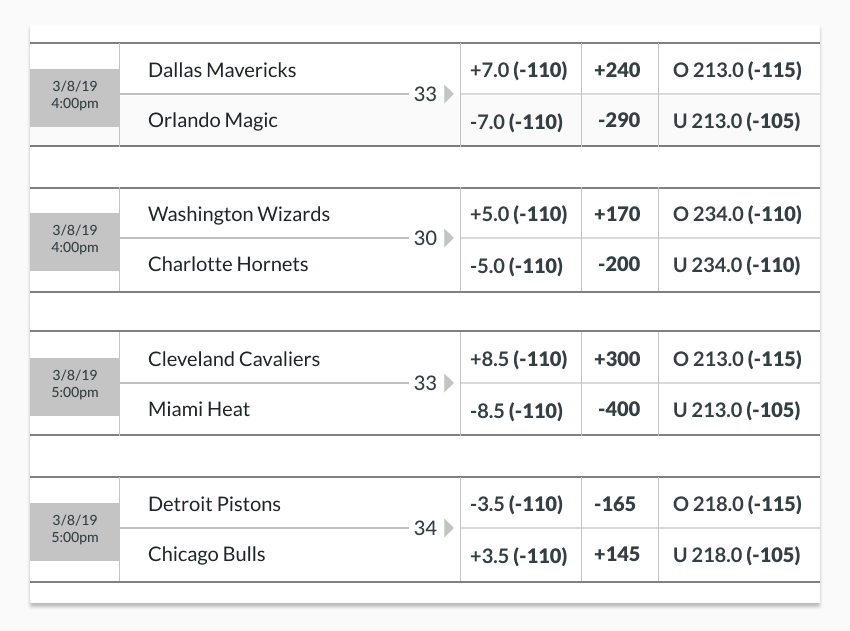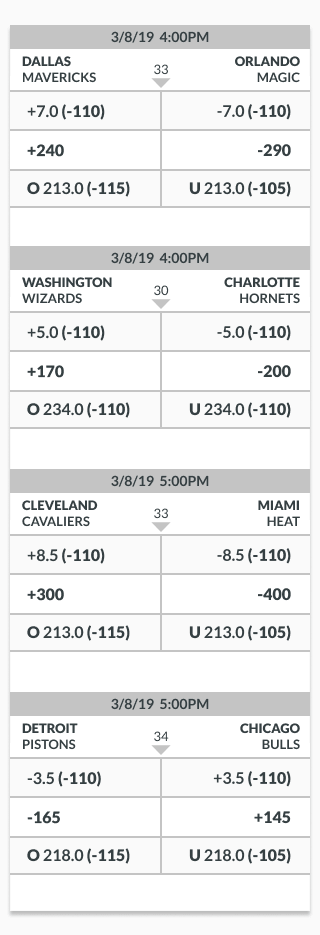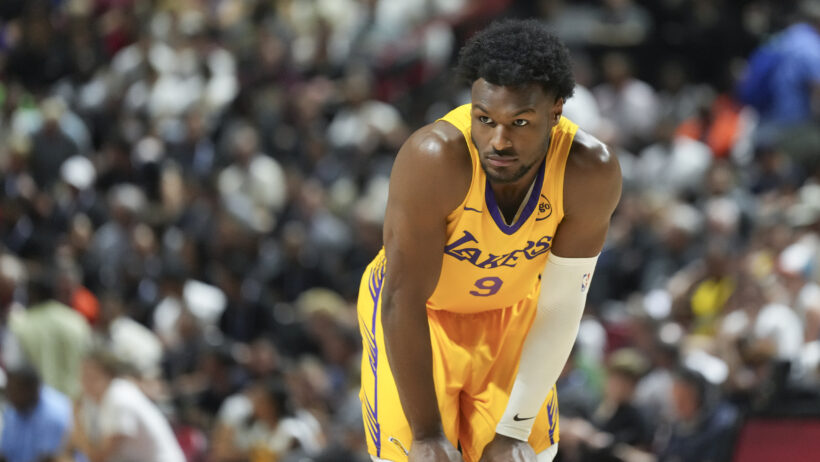How Are Point Spreads Calculated?
By Sascha Paruk
Updated:

The point spread. The “great equalizer.” Just how do sportsbooks like DraftKings and FanDuel come up with this all-important number?
Most of the time, oddsmakers try to come up with a point spread betting infrastructure that creates the least risk for the sportsbook and effectively guarantees a profit even when your bet wins.
- BETMGM SPORTSBOOK
USE CODE SBD1500 & GET $1,500 BACK IN BONUS BETS
- BET365 SPORTSBOOK
BET $5 & GET $150 IN BONUS BETS WITH CODE DIME365
- FANATICS SPORTSBOOK
BET & GET UP TO $1,000 IN BONUS BETS!
- DRAFTKINGS SPORTSBOOK
BET $5 & GET $150 IN BONUS BETS INSTANTLY!
- FANDUEL SPORTSBOOK
BET $5 & GET $150 IF YOUR BET WINS
- CAESARS SPORTSBOOK
USE CODE SBD2DYW & BET $1 TO DOUBLE THE WINNINGS ON YOUR FIRST 10 BETS!
Must be 21+. GAMBLING PROBLEM? Call 1-800-GAMBLER (CO, IL, KS, KY, MD, MI, NC, NJ, OH, PA, TN, VA, VT, WV, WY); (800) 327-5050 or gamblinghelplinema.org (MA); (877) 8-HOPENY (NY); 1-800-NEXT-STEP (AZ); (888) 789-7777 (CT); 1-800-BETS-OFF (IA); 1-800-9-WITH-IT (IN); mdgamblinghelp.org (MD); morethanagame.nc.gov (NC); 1800gambler.net (WV)
What is the key to that process? When do sportsbooks diverge from this time-tested approach? Below, we explain in detail the standard process for setting the point spread and why some riskier betting sites and apps often take a slightly different approach.
NB: This article assumes a certain level of background knowledge about what a point spread is. If you lack that foundational knowledge, consider reading this point-spread explainer first in our comprehensive section on sports-betting basics.
The Point Spread Aims to Attract Equal Betting on Both Teams
Many people assume that the point spread is designed so that both outcomes in a game—(1) the favorite covering and (2) the underdog covering—are equally likely given the relative strength of the teams.
That’s close, but not quite right.
The majority of the time, sportsbooks try to create a point spread with a margin of victory that attracts equal betting on both teams. Sometimes this is equivalent to a results-oriented spread—one which creates a truly level playing field—but not always because the public isn’t necessarily a rational actor.
Why do sportsbooks want equal betting on both teams most of the time? Simple. It’s a risk-free way for them to make money.
Sportsbooks try to create a point spread that will attract equal betting on both teams.
Look at any slate of Sunday NFL games and you will see that the football betting payouts on the two teams in any given matchup are about -110, meaning sports bettors have to wager $110 to win $100 on the NFL point spread.
The same goes for basketball betting. The image below illustrates four games on a generic NBA betting menu. As you can see, all eight teams involved in the four games have a -110 payout against the spread.


So if the sportsbook takes $550 worth of bets on the Dallas Mavericks +7.0 and $550 worth of bets on the Orlando Magic -7.0, then it has collected $1,100 in wagers. No matter who wins, the sportsbook will only have to pay out $1,050 (the $550 wagered + $500 in winnings), leaving it with a small profit.
If there is equal money on both sides, there is no risk for the sportsbook.
They don’t turn a huge profit on any single game but, to paraphrase Peter in Office Space, they do it from a much bigger tray and they do it a couple of million times.
Over time, it adds up a lot.
Why Isn’t a Result-Based Spread Always the Best Choice for a Sportsbook?
As a collective, the general betting public is not always a rational actor. People will bet on certain teams more heavily than others, even when that team doesn’t deserve it based on its quality of play.
Teams that attract an irrational amount of betting money are known as “public teams.” You will find them in every sport. They tend to be the high-profile teams with massive fan bases and (sometimes but definitely not always) history of success.
There is no universally accepted grouping of public teams, but you won’t find much argument that the teams listed in the table below qualify.
A Conservative List of “Public” Teams
| League | Team |
|---|---|
| NFL | Dallas Cowboys Green Bay Packers New England Patriots |
| NCAAF | Alabama Crimson Tide Notre Dame Fighting Irish |
| NBA | Golden State Warriors Los Angeles Lakers |
| NCAAB | Duke Blue Devils Kentucky Wildcats UNC Tar Heels |
| MLB | Chicago Cubs Los Angeles Dodgers New York Mets New York Yankees |
| NHL | Toronto Maple Leafs |
If and when sportsbooks like bet365, BetMGM, or Fanatics Sportsbook list public teams at so-called accurate betting odds, the public is likely to bet on them more heavily and potentially put the sportsbook at risk of a loss if the public team covers the spread.
For that reason, teams like the Dallas Cowboys and Duke Blue Devils will often be bigger favorites than the analytics indicate they should be.
Sometimes Sportsbooks “Take a Position” on a Game/Team
Sportsbooks are not generic, one-size-fits-all operations. Just like investors, some are more risk-averse than others.
Many sportsbooks are willing to “take a position” in certain circumstances, which basically means that they will set/leave the point spread so that the sportsbook needs a certain result in order to come out in the black.
When you see one sportsbook open a point spread at a different number than its competitors, those oddsmakers are likely taking a position on that game. They know that the lower/higher spread will attract bets on the team that is laying fewer/getting more points, but they are okay with that because their analysis says that the other outcome is more likely.
Say the Duke Blue Devils were slated to play the Wofford Terriers, a college football upstart mid-major still unknown to the general betting public. Four sportsbooks opened the spread at Duke -14.5, but a fifth sportsbook has crunched key numbers (rankings, home-field advantage, etc.) and thinks that Duke is only 11 points better than Wofford.
When you see one sportsbook open a point spread at a different number than its competitors, those oddsmakers are likely “taking a position” on that game.
In such circumstances, the fifth sportsbook may choose to open their spread at Duke -13.5. They will know that the lower spread and number of points will attract more money on Duke than Wofford., but their analysis indicates that booking more money on Duke -13.5 creates positive expected value for the company. The most likely result, according to their statisticians, is that Wofford will cover the 13.5-point spread.
If Wofford does cover, sportsbook 5 will make a much greater profit than it does on games where they do not take a position. If Duke, covers, of course, sportsbook 5 will lose money on that particular game.
Bookmakers don’t always need to be correct when they take a position; they just need to be right often enough to be profitable on the whole. Chances are that the sportsbook you’re using has done just that. It’s still in business after all.
If you aren’t yet using a sportsbook, then it’s high time to check out our sportsbook reviews to find the one that best suits your betting needs. Always remember, never ever under any circumstances bet more than you can afford to lose.

Managing Editor
Sascha has been working in the sports-betting industry since 2014, and quickly paired his strong writing skills with a burgeoning knowledge of probability and statistics. He holds an undergraduate degree in linguistics and a Juris Doctor from the University of British Columbia.




